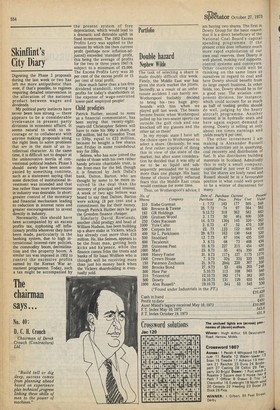Skinflint's City Diary
Digesting the Phase 3 proposals during the last week or two has left me more antipathetic than ever, if that's possible, to regimes requiring detailed intervention in the allocation of the national product between wages and dividends.
My political party instincts have never been less strong there appears to be a considerable irrelevance in present party divisions in economic affair. It seems natural to wish to encourage or to collaborate with anyone making proposals along the right lines to solve problems that are in the main of an intellectual character. At the same time, it is difficult not to despair at the uninnovative inertia of conventional political leaders. Phase 3 should surely have been accompanied by something concrete, such as a statement saying that some direction of institutional investment was intended and that less rather than more intervention in industry was desirable. In short: greater control of the monetary and financial mechanism leading to reduction in interest rates and greater encouragement to invest directly in industry.
Necessarily, this should have been accompanied by an excess profits tax, syphoning off inflationary profits wherever they have been made, particularly in the banking system, due to high international interest-rate policies, the commodity boom, decimalisation and the property boom. A similar tax was imposed in 1952 to control the excessive profits earned by the Korean War armament programme. Today, such a tax might be accompanied by the present system of free depreciation, which would lead to a dramatic and desirable uplift in fixed investment. The 1952 Excess Profits Levy was applied to the amount by which the then current profit (perhaps now inflation-adjusted) exceeded 'standard' profit, this being the average of profits for the two or three years 1947/9, subject to a minimum of £5,000. The Excess Profits Levy was 30 per cent of the excess profit or 15 per cent of total profit. How much fairer than a tax-free dividend standstill, storing up profits for today's shareholders at the expense of wage-restricted lower-paid employed people!
Child prodigies
Patrick Hutber, second to none as a financial commentator, has been saying that twenty-eightyears-old Christopher SeImes will have to raise his 300p a share, or £20 million, bid for Grendon Trust to 330p, equal to £22 million, because he bought a few shares last Friday in some roundabout way for 330p.
SeImes, who has now joined the ranks of those with his own rather handy private charitable trust, is the front-man for the bid, though it is financed by Jack Dinars bank, Dalton, Barton, who are thought by some to be more involved in the deal than the recovery of principal and interest. A week or two ago SeImes was heard to say that Dalton, Barton were asking 18 per cent and a commitment fee for their money, though Patrick Hutber says he got the grendon finance cheaper.
Similarly David Rowlands, another child prodigy and head of William Hudson, has been building up a share stake in Vickers, which has already cost more than £10 million. He, like SeImes, appears to be the front man, getting both kicks and hit'pence, while the finance comes from the trusts and banks of Sir Isaac Wolfson who is thought will be receiving more than just his money back when the Vickers shareholding is eventually sold.


































 Previous page
Previous page